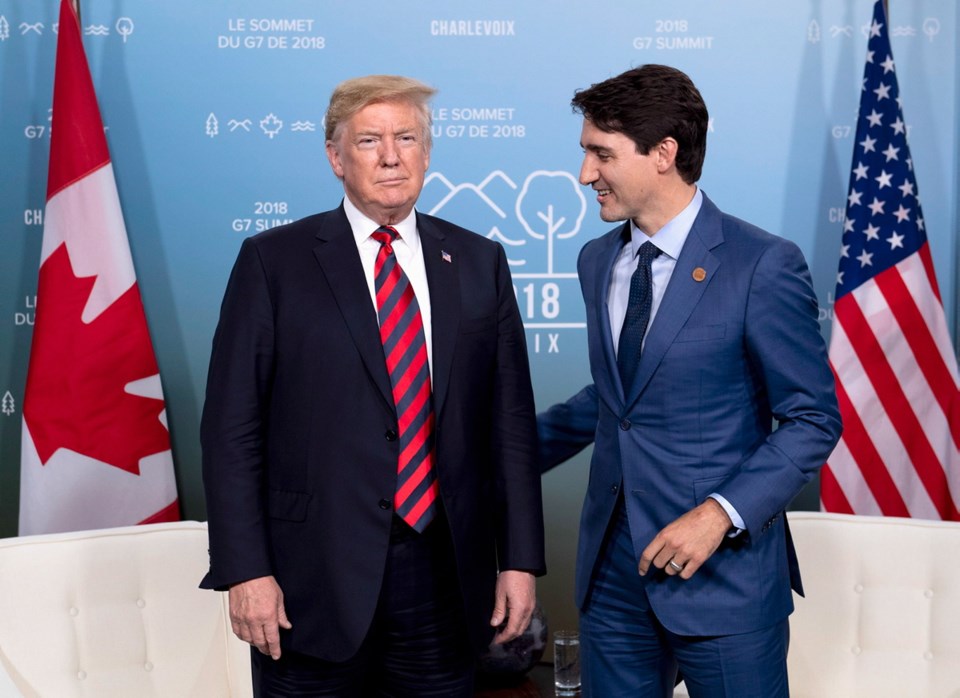A recent Angus Reid poll asked Canadians their views of the G7 leaders, along with the top politicians from Russia, Brazil and India.
Apparently, 74 per cent of Canadians polled think Donald Trump is “arrogant,” 63 per cent think Vladimir Putin is “corrupt” and 42 per cent believe Germany’s Angela Merkel is “strong.”
And our prime minister? We’re told 45 per cent of respondents see Justin Trudeau as “charismatic” (a curious term I’ll return to), 31 per cent think he’s “weak” and about a quarter of us believe he’s “bumbling.”
I have a lot of regard for the folks at Angus Reid, and they’re invariably polite and helpful. But this poll is pure sheep dip.
So what if most Canadians think Trump is arrogant? Does he get the job done?
Who cares if Trudeau is charismatic. Does he keep his promises?
And Merkel might be strong, but so was a previous German chancellor whose name comes to mind, and we know how that worked out.
The point is, all of the descriptors used in the questionnaire focused on facets of personality. This was, in effect, the political equivalent of a beauty contest.
People weren’t queried about substantive accomplishments or failures; they were asked to choose from a list that leaned heavily toward image factors. I strongly suspect that’s where Trudeau’s “charismatic” rating came from.
Why this concentration on appearances? Why not ask what really matters — whether the leaders are effective, do a good job, manage the budget, make a difference?
Former U.S. president Barack Obama was admired for his inspiring speeches and personal charm, both positive characteristics, or so you would suppose.
Yet under his eight years of leadership, the Democratic Party lost more than 1,000 elective offices at the local, state and federal level — the worst hammering since the 1920s. Americans liked the man, but not his policies.
Let’s turn to our own corner of the world. Anyone who knew premier Glen Clark would have called him charismatic and down to Earth, two of the positive descriptors offered.
I doubt very many thought him “boring,” “uncaring” or “cowardly,” some of the negatives served up. Yet he led a chaotic administration that ran his party into the ground. Charismatic didn’t cut it.
Equally, I suspect, most British Columbians thought premier Gordon Campbell “secretive” (he was), “bullying” (ditto) and “dishonest” (he wasn’t). But he was a first-rate manager (an option not offered), and he set up his party for a 16-year term in office.
Voters might have disliked Campbell as a person, but they saw in him competence and an orderly mind, two other choices not provided in the questionnaire. You could say the same about former prime minister Stephen Harper, a man distrusted for his secretiveness, but elected and re-elected three times.
This is more than a beef about a poorly designed poll. It’s a plea to stay focused on what’s important in politics.
Yes, I concede it. Of course, corruption and dishonesty matter. We need leaders we can believe, who aren’t in it simply to get rich.
But there’s a broader issue here. I remember as a teenager being taken to a cattle auction at a small town in Scotland. My dad needed to buy winter breed-stock for the farm.
A crusty old gentleman from the hill country appeared with a single ancient cow, and the auctioneer quickly ran out of bids. But her owner refused to sell. I asked my dad why.
Because, I was told, he’s letting emotions overrule his common sense. He can’t make a realistic assessment of her worth.
That, in effect, is what this Angus Reid poll has done. It has reduced the valuation of political leadership to the equivalent of a cattle auction.



